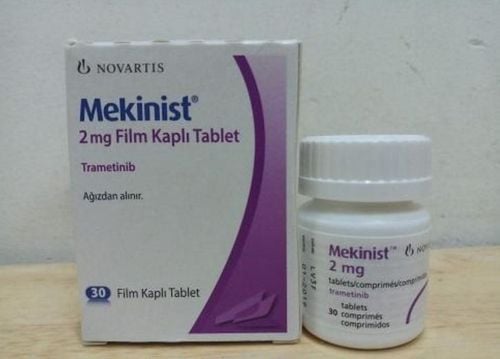This is an automatically translated article.
Cobimetinib is an anti-cancer drug that interferes with the growth and spread of cancer cells in the body. To find out what is the use of Cobimetinib? How to use and dosage? Please read the article below.
1. What is Cobimetinib?
Cobimetinib is used together with Vemurafenib (Zelboraf) to treat skin cancer that has spread or cannot be removed with surgery.
Cobimetinib is in a class of drugs also known as kinase inhibitors. It works by blocking the action of an abnormal protein that signals cancer cells to multiply. This will help slow or stop the spread of cancer cells.
2. Cobimetinib side effects
Get emergency medical help if you have signs of an allergic reaction such as: hives; shortness of breath ; swelling of the face, lips, tongue, or throat.
Stop taking Cobimetinib and call your doctor at once if you have the following symptoms:
Change and partial loss of vision, seeing halos around lights; Unexplained muscle pain; easy bruising or bleeding (nosebleeds, bleeding gums); signs of bleeding inside the body such as weakness, dizziness, headache, red or pink urine, bloody stools, coughing up blood or vomiting; signs of a heart problem: Cough, wheezing, shortness of breath (even with mild exertion), chest pain, heart palpitations, swelling in your feet or ankles; Low sodium levels in the body leading to headache, confusion, slurred speech, severe weakness, vomiting, loss of coordination, feeling unsteady; Liver problems: Nausea, upper stomach pain, tired feeling, loss of appetite, dark urine, clay-colored stools, yellowing of the skin or eyes; Severe skin reactions: Skin pain, itching, redness, thick or wrinkled skin blisters, skin rash that spreads and causes blistering and peeling. Common side effects may include:
Nausea, vomiting, diarrhea; Fever; Sunburn or increased sensitivity to sunlight; Low sodium levels; Abnormal lab tests.
3. Drug interactions
Although certain medicines should not be taken together, in other cases 2 different medicines can be taken together even if an interaction can occur. In these cases, your doctor may want to change the dose or take other precautions. When you are taking this medicine, it is especially important for a healthcare professional to know if you are taking any of the medicines listed below. The following interactions were also selected on the basis of their potential significance and are not necessarily all inclusive:
Aprepitant, Atazanavir, Boceprevir, Bosentan, Carbamazepine; Clarithromycin, Cobicistat, Conivaptan, Diltiazem, Dronedarone; Duvelisib, Efavirenz, Enzalutamide, Erythromycin, Fluconazole; Fosaprepitant, Fosnetupitant, Fosphenytoin, Idelalisib, Imatinib, Indinavir, Itraconazole, Ivosidenib; Ketoconazole, Larotrectinib, Lefamulin, Letermovir, Lopinavir, Lorlatinib, Mitotane, Modafinil, Nefazodone; Nelfinavir, Netupitant, Phenobarbital, Phenytoin, Posaconazole, Primidone, Rifampin, Ritonavir, Saquinavir, St John's Wort, Telaprevir, Telithromycin, Verapamil, Voriconazole.
4. How to use Cobimetinib
How to use:
Cotellic is injected in a treatment cycle of about 28 days. You may only need to take the pill for the first 21 days of each cycle. Your doctor will determine the length of your treatment with Cobimetinib. Do not change your dose or dosing schedule without your doctor's advice. You can take Cotellic with or without food. Check your skin on a regular basis while you are taking Cotellic. Tell your doctor if you notice any new skin symptoms such as redness, sores that do not heal, warts or moles that have changed in size or color. Dosage:
Usual Adult Dose for Melanoma - Metastasis: 60 mg orally once daily for the first 21 days of each 28-day cycle. Duration of treatment: Until disease progression or unacceptable toxicity. In combination with Vemurafenib, it is indicated for the treatment of patients with unresectable or metastatic melanoma with the BRAF V600E or V600K mutation. Missed dose: This medicine needs to be given on a fixed schedule. If you miss a dose, call your doctor for instructions. If you vomit after taking the medicine call your doctor or pharmacist for instructions.
5. Be careful when using drugs
When deciding to take a drug, the risks of taking the drug must be weighed against the benefits it offers. This is the decision of you and your doctor. For this medicine you need to consider the following:
Allergies : Tell your doctor if you have ever had any unusual or allergic reaction to this or any other medicine. Pediatrics: Appropriate studies have not been performed on the relationship of age to the effects of cobimetinib in the pediatric population. Geriatrics: Appropriate studies also performed to date have not demonstrated geriatric-specific problems that would limit the usefulness of cobimetinib in the elderly. Breast-feeding: There are no adequate studies in women to determine the infant risk when using this medicine during breast-feeding. Weigh the potential benefits against the possible risks before you use this medicine if you are breastfeeding. Store the medicine in the sealed container at room temperature, away from heat, moisture and direct light. Keep out of reach of CHILDREN. Medicines that have expired or are no longer needed should not be kept.
Please dial HOTLINE for more information or register for an appointment HERE. Download MyVinmec app to make appointments faster and to manage your bookings easily.













